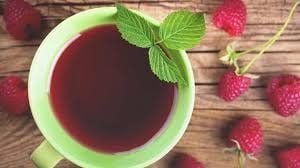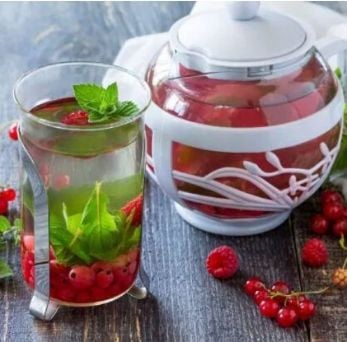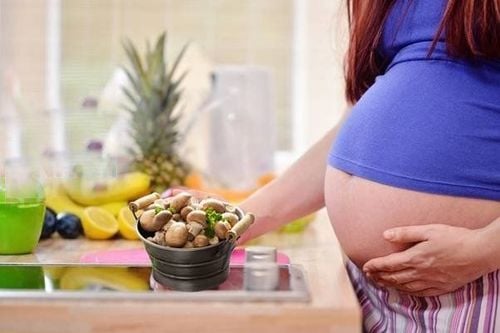Red raspberry leaf tea is a good food for pregnant women. There is a lot of scientific evidence that they are effective in shortening the duration of labor and obstetric complications. In addition, red raspberry leaf tea is also a food rich in vitamins and minerals.
1. Red Raspberry Leaves - A Source of Nutrients and Antioxidants
Red raspberry leaves are rich in vitamins and minerals. They are a source of B vitamins, vitamin C, and several minerals such as potassium, magnesium, zinc, phosphorus, and iron. However, the most notable feature is their antioxidant properties.
Red raspberry leaves contain polyphenols such as tannins and flavonoids, which act as antioxidants, helping to reduce the risk of damage to healthy cells in the body. In addition, red raspberry leaves contain a small amount of ellagic acid, which has been shown to neutralize carcinogens and even contribute to the self-destruction of cancer cells. The evidence for the anticancer properties of red raspberry leaves still requires further research, but the current findings are promising. Red raspberry leaf tea contains health-promoting components.

2. Red Raspberry Leaf Tea Is Especially Beneficial for Women
Red raspberry leaf tea offers several health benefits for women in general, especially for pregnant women. In fact, it is often considered an herbal remedy that promotes women's health.
Some studies support the anecdotal evidence that red raspberry leaves can help reduce symptoms of premenstrual syndrome (PMS), such as cramps, nausea, vomiting, and diarrhea.
Red raspberry leaves contain fragarine, a plant compound that helps tone the pelvic muscles, which may reduce cramps caused by muscle contractions during menstruation. Moreover, 28 grams of red raspberry leaves contain 3.3 mg of iron, which accounts for 18% of the recommended daily intake for women aged 19-50. Adequate iron intake can help combat anemia, which is common in women with prolonged menstrual cycles.
3. Red Raspberry Leaf Tea During Pregnancy
Herbal teas have long been used by midwives to alleviate some of the symptoms that can negatively affect pregnancy and labor.
A study assessed the use of herbal remedies among 600 pregnant women. The results showed that 52% of women regularly used some types of herbs, and 63% of them drank red raspberry leaf tea.
Although red raspberry leaf tea is often recommended during the second and third trimesters, some women still use it as an herbal remedy to relieve nausea and vomiting during the first trimester.
Red raspberry leaf tea is also used to strengthen the uterus, making labor easier, less painful, and helping to prevent excessive bleeding after childbirth.

3.1. Shortening the Duration of Labor
Red raspberry leaf tea helps shorten the duration of labor. The fragarine compound in red raspberry leaves helps tone the pelvic muscles, including the uterine walls, which makes childbirth easier.
A study of 108 women found that those who drank red raspberry leaf tea had a shorter first-stage labor. A study conducted a year later on 192 women showed that red raspberry leaf tea did not shorten the first stage of labor but reduced the second stage by an average of 9.59 minutes.
3.2. Reducing Interventions and Obstetric Complications
Some evidence suggests that drinking red raspberry leaf tea helps reduce complications during childbirth. A study showed that women who drank red raspberry leaf tea during pregnancy had less need for forceps and other interventions, as well as fewer complications before and after childbirth.
Similarly, another study showed a reduction of 11% in the use of forceps during delivery for women who drank red raspberry leaf tea during the last 8 weeks of pregnancy.
The American Pregnancy Association also states that drinking red raspberry leaf tea can reduce the need for interventions during childbirth. Faster labor also reduces blood loss after delivery.

4. Side Effects and Recommended Dosage of Red Raspberry Leaf Tea
Red raspberry leaf tea is generally safe for most people. Some side effects may occur, but they are typically mild and not harmful to health. This herbal tea has laxative properties and may cause diarrhea in some individuals. It can also have diuretic effects, increasing urination. Therefore, it is recommended to consult with a doctor before trying the tea.
For pregnant women, the best time to start drinking red raspberry leaf tea is around 32 weeks of pregnancy. A dosage of about 2.4 mg/day, equivalent to 3 cups of tea per day, is appropriate. Before 32 weeks of pregnancy, it is advised to limit tea intake to 1 cup per day.
If Braxton Hicks contractions or spotting occur during the second or third trimester while drinking the tea, it is recommended to stop using it.
Please dial HOTLINE for more information or register for an appointment HERE. Download MyVinmec app to make appointments faster and to manage your bookings easily.
Reference source: healthline.com














